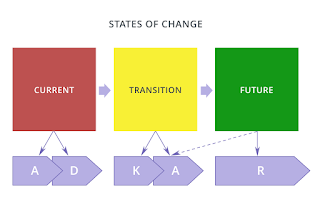26 January 2020 - I’m going through the change with Prosci ADKAR
I’ve been reading a book about change management by Prosci and they use a term called ADKAR to define the different stages of change.
A = Awareness
D = Desire
K = Knowledge
A = Ability
R = Reinforcement
ADKAR can be used for both organisational and individual change management, it’s just the scale that is different.
January is a time of year that many of us consider New Year resolutions, and many can often be health related, to help us work off the excesses we piled on over the Christmas period.
While it wasn't not a personal resolution, I was conscious of my over cake consumption and felt the need to do something about it. I’m going to use Prosci ADKAR to explain how I could manage this individual change.
Awareness is the first element. Like all over indulgence being aware of the problem is the first step. I was aware that my shape had changed over the months and agreed, if I didn’t alter my behaviour, then it would continue to be a problem. If I acted upon this change then I was aware of the benefits too.
- My clothes will fit better
- I will feel happier about my shape
- The health benefits will weigh in my favour (pardon the pun)
Desire is the next phase and can often be the largest hurdle to overcome in both individual and organisational change. We are in our natural comfort zones when we know what we are doing and like what we do. Change, in any form, can be seen as disruptive, exhausting and challenging. To therefore willingly put ourselves into a path of change is something an individual or business generally does not do lightly. The reasons for change and their benefits need to be clearly defined for us to want to do this. We need to believe in them and want to achieve the outcomes.
In an organisational change we often find that if there is low or no desire by individuals then some may become disruptive, while others may choose to leave. In an organisation level, a cohesive leadership wanting to make the change is critical to success as individuals within the business will look to them for reassurance on aspects of the ‘want’ to change.
On an individual level, especially if the change is of your own doing, then you have to keep reminding yourself of the motivations of the action and the benefits otherwise you cannot successfully move to the next ADKAR stage. You must want to make the change.
In ADKAR it is suggested that you keep working on the stage that the organisation or individual is stuck on and only progress further once that has been satisfied.
For me, I had the desire to make the health change but was frequently challenged by my equally high desire to consume cake and drink fizz. There is a risk that I could be stuck on the desire stage for a bit longer.
Knowledge comes next. For an individual or organisation to change they need to know what to do and how to do it. For organisational change that could be asking a team to use a new system. To gain knowledge about the new system and processes the team may be required to attend training sessions.
For an individual, wanting to lose some weight, it could be learning about dietary management and exercise.
Using my own example, while I was aware of the need to change and had some level of desire then the knowledge on how to go about it could help me move forward. Using dietary knew how I could consider a more balanced diet of salads and other low calorie meals, while allowing the occasional treat of puddings and alcohol a few times a week.
Ability follows on. This focusses on the capabilities of an organisation or individual to make the change.
In the organisation with a team using a new system, have they been given the training? Do they have the appropriate access to hardware and software?
For the individual losing weight has a dietary plan been put together? Are they aware of the right foods to eat and which to avoid? Have they gone shopping and purchased appropriately? Do they have an exercise training plan that can work to their health and lifestyle? Are they able to complete the exercise satisfactorily? Do they have support from a trainer or downloaded an app to track diet and exercise activities?
For me and my diet it was a case of not buying the treat products into the house in the first place so I just had to leave those puddings on the supermarket shelves. I just looked longingly at my hefty wine rack and only picked from it once a week.
Reinforcement is the final part of the ADKAR program. Once an individual or organisation has stepped onto their path of change it is important to ensure adoption of the new behaviour is maintained. Permanent change is at risk if actors are able to slip into their old ways. It’s like muscle memory and the new change needs to be worked in like lasting habit for it to stick and be successful.
In an organisation this could be about creating exception reports within the new system to encourage correct behaviour and rewarding the early adopters. It’s about giving support and further training to those who need it and to keep delivering the messages of why the change happened and the continued benefits.
For the individual who maybe craving a cake or an afternoon sat on the sofa, it is to have the reminder messages of why losing weight is a good thing. Maybe take ‘before’ measurements and track their progress to show how the behaviour change is working for their results.
For me, I had my trusty scales to keep me on track and of course, the benefits to remind myself of why salad is my friend and going for a run is a good idea.
Still occasionally having to work on that desire bit though...
Happy ADKAR!








Comments
Post a Comment